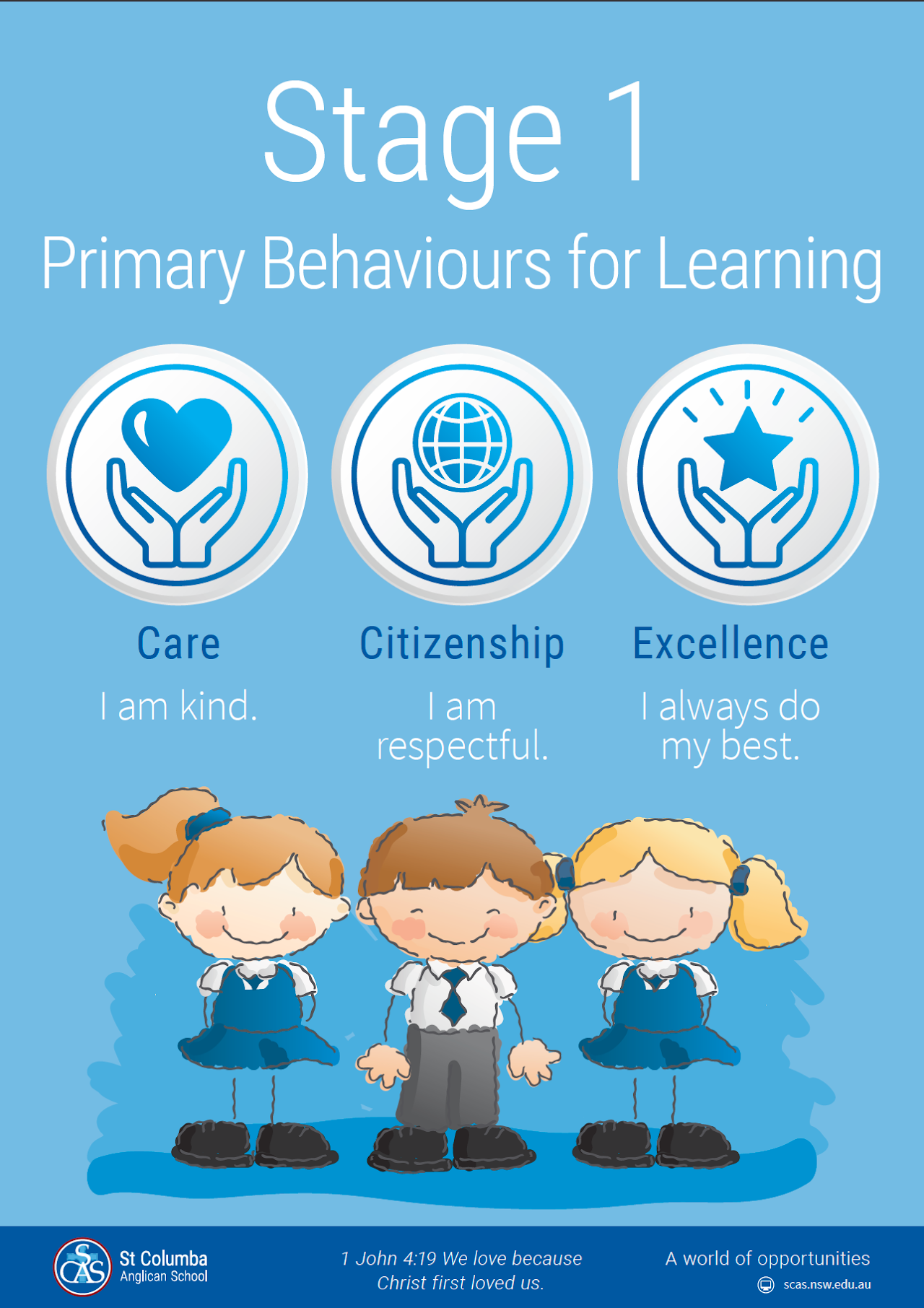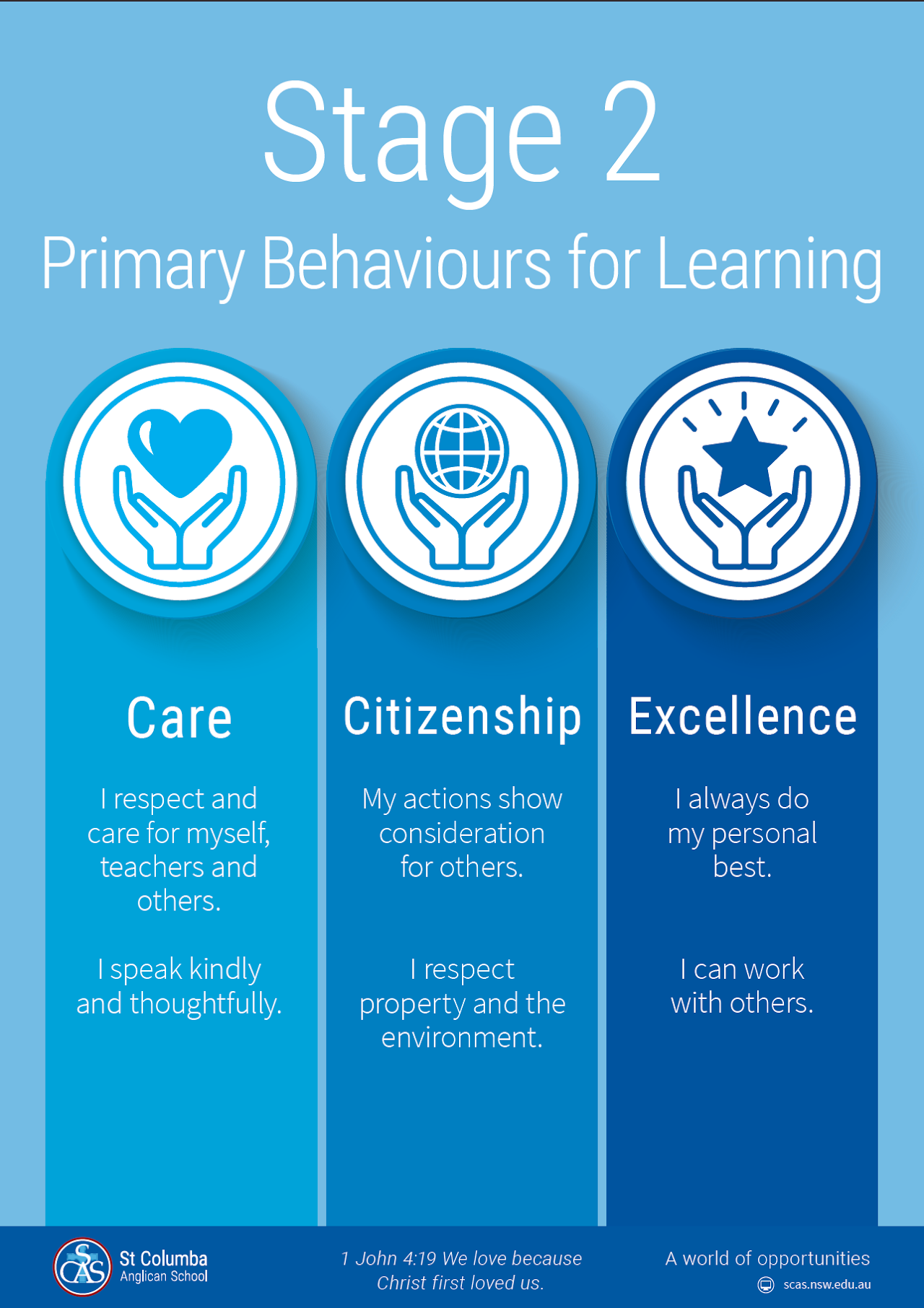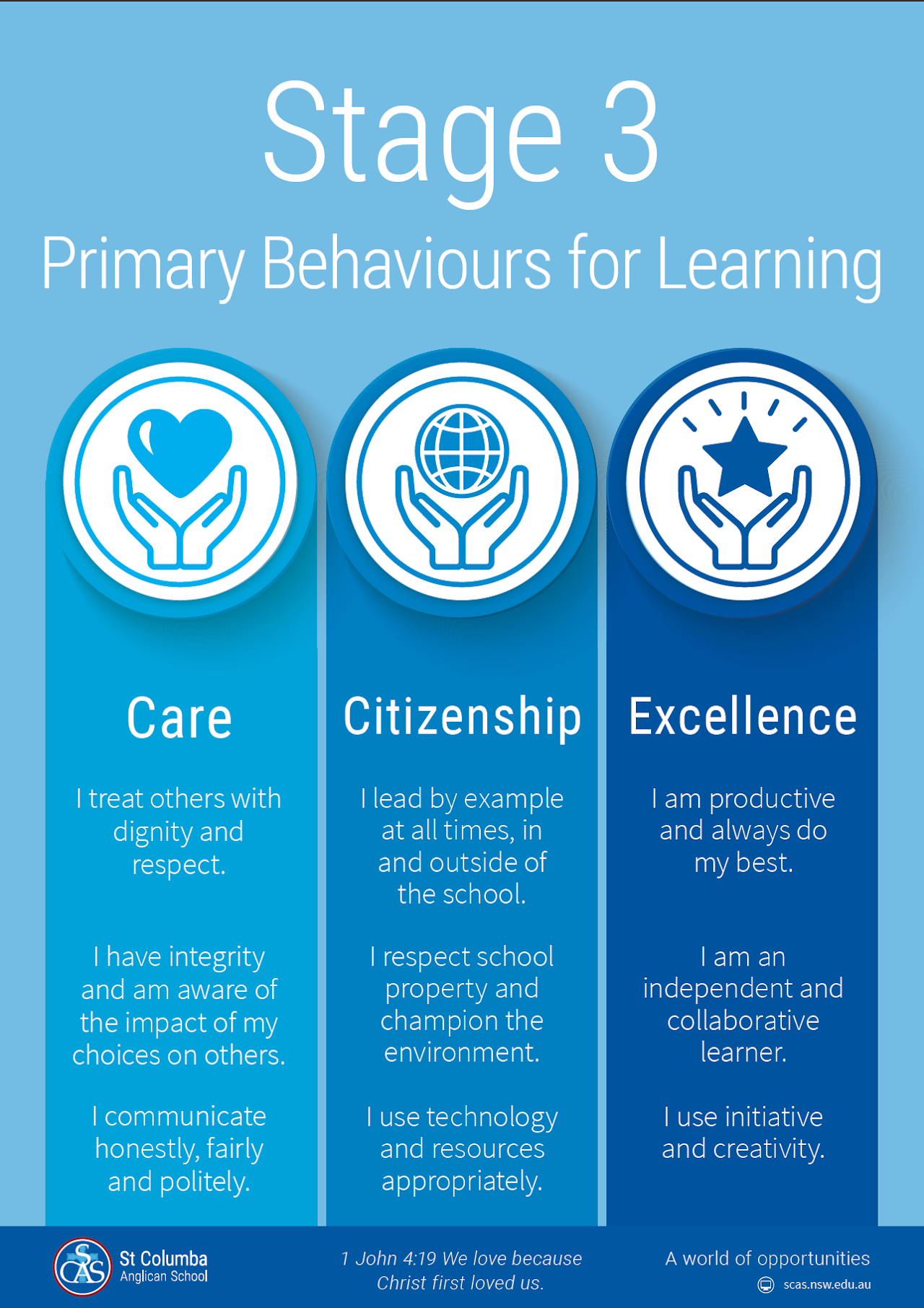General school rules ensure that our students are safe and equipment is respected. Sensible and respectful behaviour is expected when in classrooms, the playground and when using public transport.
Students in Primary School are asked to follow three basic understandings when in our playground and classrooms. This will ensure that our school is safe and fun for all:
I care for others
I am a responsible citizen
I am an excellent learner
 |  |  |
There are areas of school life in which there are very clear policies for all students at St Columba:
St Columba Anglican School believes that every person in the School should be valued, cared for, and safe. This means that bullying behaviour has no place in this School.
Bullying typically includes an abuse of power (which can be based on physical, age, psychological, racial or numerical victimisation). It may include physical intimidation, violence, persistent teasing, verbal abuse, picking on someone over a period of time or deliberately marginalising a fellow student and is a problem that causes serious distress. Therefore, the issue of bullying is the responsibility of everybody in the School. This should be understood, freely talked about and worked at so that all students feel safe and comfortable at school.
Reporting Bullying
Students and their parents/guardians are sometimes reluctant to pursue bullying incidents for fear that it will only make matters worse. A key part of the School's bullying prevention and intervention strategy is to encourage reporting of bullying incidents as well as assuring students who experience bullying (and parents/caregivers) that: bullying is not tolerated within the School, their concerns will be taken seriously, the School has a clear strategy for dealing with bullying issues, and follow-up communication is provided.
Bullying incidents can be advised to the School verbally or in writing through any of the following avenues: informing a trusted teacher, using the 'nobullying@scas.nsw.edu.au' email address, informing a student’s teacher or the Secondary Dean of Students, Primary Director of Wellbeing, Head of School, Principal or School Chaplain.
Bullying behaviours vary enormously in their extent and intent, and, as a consequence, each incident needs to be dealt with on its facts. In all circumstances, the School:
See also: Anti-Bullying at SCAS
St Columba Anglican School has a zero-tolerance approach to any form of racism. Negative comments, marginalisation, ostracism, vilification, exclusion from activities and games, inappropriate physical contact based on or related to race or culture are indefensible and cannot be tolerated. Students who indulge in racism will be counselled, and sanctions may be applied.
St Columba Anglican School is committed to providing all staff and students with a working and learning environment free from sexual harassment.
Students at St Columba Anglican School are expected to interact with each other, staff, visitors, parents/caregivers and volunteers in a positive manner. All St Columba Anglican School community members are expected to acknowledge courteous behaviour, including “please” and “thank you” when making requests and using names and titles whenever they are known. All forms of inappropriate language are discouraged. Students ignoring common courtesy will be corrected, and those using profane language will be warned once before becoming subject to the School’s Disciplinary Procedures.
A digital citizen refers to a person who has the knowledge and skills to effectively use digital technologies to communicate with others, participate in society and create and consume digital content. Digital citizenship is about confidence and positive engagement with digital technologies. By educating students about digital citizenship, they will have the opportunity to develop the skills required to navigate a digital world. Digital Citizenship themes and responsibilities are explicitly taught through student Wellbeing programs.
The following policies guide students and digital citizenship.
Digital Citizenship in Primary School
While at school, student activity on the school network and internet may be monitored. Any student activity in the SCAS Google Education Suite can be monitored and reviewed. This includes emails or communications sent while students are connected to other networks. Message or chat apps can only be used within a supervised class activity. Devices that record images or sound must only be used for learning purposes. Devices containing inappropriate or offensive material will be confiscated, and their owner’s parents/caregivers will be informed.
Social networks are dynamic, positive and connective when used appropriately. Social media terms and agreements generally exclude students from under 13 years accessing their services. At SCAS, we safely utilise selected social media to enhance teaching and learning. In these cases, students can use these secure services below 13 years.
Consequences of a Breach of Policy
A breach of the BYOT, ICT, AI or Social Media Policies will resuDiscipline Procedureslt in disciplinary action in line with Discipline Procedures. Consequences could include closely supervised technology access, a behavioural contract or a technology ban.
Mobile Phones
St Columba Anglican School discourages students from bringing mobile phones and personal technology devices to school, and mobile phones are not to be used by students throughout the school day.
The School cannot accept liability for lost, damaged, or stolen devices, and students who bring these items to school do so at their own risk.
Mobile phones and other devices that come to the attention of members of staff during normal school days will be immediately confiscated and will remain in safekeeping until the end of the day.
Mobile telephones and electronic devices are not permitted on Primary School excursions (including HRIS). In the case of an emergency, the SCAS administration will communicate with teachers, parents and caregivers.
When students are attending overnight camps, all mobile phones will be collected once students arrive at camp and will be kept by the teacher for the duration of the camp. The only time mobile phones can be used is whilst travelling to and from the camp on the bus.
Smart Watches
Smart watches and related devices must be switched to flight mode during the school day. Students are not permitted to use their smart watch or other device as a substitute for a mobile phone.
Other Devices
Devices that record images or sound must only be used for learning purposes. Recording images for any other purpose is not permitted, and students should not be accessing these devices during the school day. This includes 'toys' such as children's smartwatches and phones with recording capability. Devices found to contain inappropriate or offensive material will be confiscated, and their owners’ parents/caregivers will be informed.
All documents and other content are to be free from inappropriate or offensive content and data-sharing files. USB memory sticks or any other digital storage media that are found to contain inappropriate or offensive material will be confiscated, and the owner’s parents/caregivers will be immediately informed.
Any photographing or filming of a teacher or any staff member by a student/s or distribution of staff images without the teacher’s specific permission will be viewed as a severe breach of School rules and may result in disciplinary action, including suspension or even expulsion.
Unfortunately, it is becoming more common for students to use their phones to record (audio and video) teachers and for these recordings to be used in complaints against them.
Making films on a smartphone or using surveillance and listening devices raises essential issues such as consent and privacy.
Students should not record, upload or distribute in any other way visual and auditory material concerning staff and other students.
The law prohibits students from creating fake online profiles for teachers. But it makes it a crime to post real images or make any statement online, even if it's true, that provokes harassment.
Playing a recording to anyone other than the parties to the activity is “publication”. The exceptions to this rule include publication “to protect lawful interests”, or in the course of “legal or disciplinary proceedings”. These circumstances are very narrow. For example, a student merely complaining to the school about a teacher is not the protection of “lawful interests”.
The following items must not be brought onto the School campus or to any School event at anytime:
You can find a detailed explanation of our Uniform policy on our Uniform Guidelines page. In general:
In Secondary School, the following processes are in place for multiple uniform infractions:
The following areas are out of bounds for all students unless express permission is given from a teacher:
In both Primary and Secondary School, the following expectations must be met:
Classroom Discipline Procedures in Primary School
The Primary Behaviours for Learning identify the behaviours required to support our School Values of Care, Citizenship and Excellence. Behaviour management strategies are incorporated in all classroom and learning activities. Additionally, students are supported through programs such as Zones of Regulation and the Kindergarten to Year 6 Wellbeing program.
However, students can require prompting when their behaviour falls out of line with expectations. Incidents can occur, and staff determine whether a first, second and third warning is required or behaviours are escalated to the involvement of the Primary School Leadership team, i.e. Stage Coordinator, Deputy Director of Wellbeing or Head of Primary.
Consequences within a classroom setting can include completing work in break times, a short time out period or a conversation with parents about what has occurred and teacher concerns.
Most days, students can spend break times outside in various areas of the school. The following rules apply when students are in and around the campus: